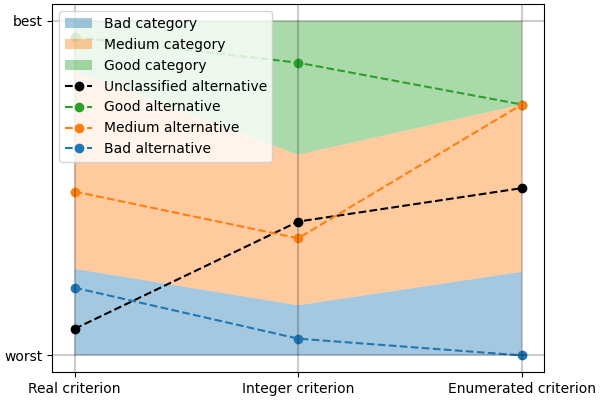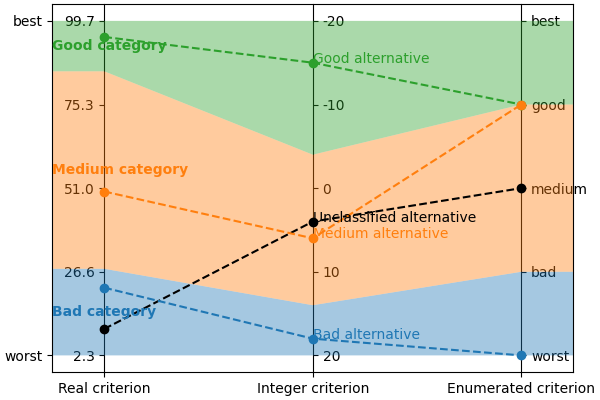Changelog¶
Version 1.1.0 (2024-02-09)¶
Publish the Python API¶
This release establishes the second tier of the stable API: the Python interface.
Introduction: our “Python API” guide, downloadable as a Jupyter Notebook
Reference: in our complete reference documentation
Improve lincs visualize¶
Replace legend by colored text annotations
Support visualizing single-criterion models
Add one graduated vertical axis per criterion
See the following “before” and “after” images:


Smaller changes¶
Breaking: Drop support for Python 3.7
Support discrete criteria (with enumerated or integer values)
Homogenize post-processing: this changes the numerical values of the thresholds learned by SAT-based approaches, but not their achieved accuracy
Improve validation of input data (e.g. check consistency between problem, model, and alternatives)
Build a Docker image on release (not published since 0.5.0), documented in our “Get started” guide
Support
copy.deepcopyon I/O objectsSupport pickling of I/O objects
Fix
TerminateAfterIterationsandTerminateAfterIterationsWithoutProgressstrategies: they were allowing slightly too many iterationsExpose parameters of EvalMaxSAT in our API and command-line interface (see
lincs learn classification-model --help):--ucncs.max-sat-by-separation.solver(for consistency, always"eval-max-sat"for now)--ucncs.max-sat-by-separation.eval-max-sat.nb-minimize-threads--ucncs.max-sat-by-separation.eval-max-sat.timeout-fast-minimize--ucncs.max-sat-by-separation.eval-max-sat.coef-minimize-time--ucncs.max-sat-by-coalitions.solver(for consistency, always"eval-max-sat"for now)--ucncs.max-sat-by-coalitions.eval-max-sat.nb-minimize-threads--ucncs.max-sat-by-coalitions.eval-max-sat.timeout-fast-minimize--ucncs.max-sat-by-coalitions.eval-max-sat.coef-minimize-time
Version 1.0.0 (2023-11-22)¶
This is the first stable release of lincs. It establishes the first tier of the stable API: the command-line interface.
Add a roadmap in the documentation
Version 0.11.1¶
This is the third release candidate for version 1.0.0.
Technical refactoring
Version 0.11.0¶
This is the second release candidate for version 1.0.0.
Breaking Rename
category_correlationtopreference_directionin problem filesBreaking Rename the
growingpreference direction toincreasingin problem filesBreaking Rename the
categoriesattribute in problem files toordered_categoriesin problem filesMake names of generated categories more explicit (“Worst category”, “Intermediate category N”, “Best category”)
Support
isotone(resp.antitone) as a synonym forincreasing(resp.decreasing) in problem filesAdd
lincs describecommand to produce human-readable descriptions of problems and modelsRemove comments about termination conditions from learned models, but:
Add
--mrsort.weights-profiles-breed.output-metadatato generate in YAML the data previously found in those commentsProvide a Jupyter notebook to help follow the “Get Started” guide (and use Jupyter for all integration tests)
Document the “externally managed” error on Ubuntu 23.4+
(In versions below, the term “category correlation” was used instead of “preference direction”.)
Versions 0.10.0 to 0.10.3¶
This is the first release candidate for version 1.0.0.
Breaking: Allow more flexible description of accepted values in the model json schema. See user guide for details.
Breaking: Rename option
--ucncs.approachto--ucncs.strategyBreaking: Rename option
--output-classified-alternativesto--output-alternativesFix line ends on Windows
Fix
lincs visualizeto use criteria’s min/max values and category correlationValidate consistency with problem when loading alternatives or model files
Output “reproduction command” in
lincs classifyImprove documentation
Versions 0.9.0 to 0.9.2¶
Pre-process the learning set before all learning algorithms.
Possible values for each criterion are listed and sorted before the actual learning starts so that learning algorithms now see all criteria as:
having increasing correlation with the categories
having values in a range of integers
This is a simplification for implementers of learning algorithms, and improves the performance of the weights-profiles-breed approach.
Expose
SufficientCoalitions::upset_rootsto PythonFix alternative names when using the
--max-imbalanceoption oflincs generate classified-alternativesProduce cleaner error when
--max-imbalanceis too tightPrint number of iterations at the end of WPB learnings
Display lincs’ version in the “Reproduction command” comment in generated files
Various improvements to the code’s readability
Version 0.8.7¶
Integrate CUDA parts on Windows
Compile with OpenMP on Windows
Versions 0.8.5 to 0.8.6¶
Distribute binary wheels for Windows!
Versions 0.8.0 to 0.8.4¶
Rename option
--...max-duration-secondsto--...max-durationDisplay termination condition after learning using the
weights-profiles-breedapproachMake termination of the
weights-profiles-breedapproach more consistentIntegrate Chrones (as an optional dependency, on Linux only)
Display iterations in
--...verbosemodeFix pernicious memory bug
Version 0.7.0¶
Bugfixes:
Fix the Linux wheels: make sure they are built with GPU support
Improve building lincs without
nvcc(e.g. on macOS):provide the
lincs info has-gpucommandadapt
lincs learn classification-model --help
Features:
Add “max-SAT by coalitions” and “max-SAT by separation” learning approaches (hopefully correct this time!)
Use YAML anchors and aliases to limit repetitions in the model file format when describing \(U^c \textsf{-} NCS\) models
Specifying the minimum and maximum values for each criterion in the problem file:
Generate synthetic data using these attributes (
--denormalized-min-max)Adapt the learning algorithms to use these attributes
Support criteria with decreasing correlation with the categories:
in the problem file
when generating synthetic data (
--allow-decreasing-criteria)in the learning algorithms
Add a comment to all generated files stating the command-line to use to re-generate them
Use enough decimals when storing floating point values in models to avoid any loss of precision
Log final accuracy with
--mrsort.weights-profiles-breed.verboseImprove tests
Version 0.6.0¶
Remove buggy “max-SAT by coalitions” approach
Add “SAT by separation” approach
Version 0.5.1¶
Publish wheels for macOS
Version 0.5.0¶
Implement “SAT by coalitions” and “max-SAT by coalitions” removed in 0.6.0 learning methods
Add misclassify_alternatives to synthesize noise on alternatives
Expend the model file format to support specifying the sufficient coalitions by their roots
Produce “manylinux_2_31” binary wheels
Improve YAML schemas for problem and model file formats
Use the “flow” YAML formatting for arrays of scalars
Improve consistency between Python and C++ APIs (not yet documented though)
Add more control over the “weights, profiles, breed” learning method (termination strategies, “verbose” option)
Add an expansion point for the breeding part of “weights, profiles, breed”
Add an exception for failed learnings
Version 0.4.5¶
Use JSON schemas to document and validate the problem and model files
Support development on macOS and on machines without a GPU
Improve documentation
Versions 0.4.1 to 0.4.4¶
Never properly published
Version 0.4.0¶
Add a GPU (CUDA) implementation of the accuracy heuristic strategy for the “weights, profiles, breed” learning method
Introduce Alglib as a LP solver for the “weights, profiles, breed” learning method
Publish a Docker image with lincs installed
Change “domain” to “problem” everywhere
Improve documentation
Improve model and alternatives visualization
Expose ‘Alternative::category’ properly
Versions 0.3.4 to 0.3.7¶
Improve documentation
Version 0.3.3¶
Fix Python package description
Version 0.3.2¶
License (LGPLv3)
Version 0.3.1¶
Fix installation (missing C++ header file)
Version 0.3.0¶
Implement learning an MR-Sort model using Sobrie’s heuristic on CPU
Version 0.2.2¶
Add options: generate model –mrsort.fixed-weights-sum and generate classified-alternatives –max-imbalance
Version 0.2.1¶
Fix images on the PyPI website
Version 0.2.0¶
Implement generation of pseudo-random synthetic data
Implement classification by MR-Sort models
Kick-off the documentation effort with a quite nice first iteration of the README
Version 0.1.3¶
Initial publication with little functionality